DCPA NEWS CENTER
Enjoy the best stories and perspectives from the theatre world today.
Enjoy the best stories and perspectives from the theatre world today.
To return to the DCPA Subscriber News Center, click here.
DCPA NEWSCENTER: How did you come to direct the DCPA Theatre Company’s production of The Chinese Lady by Lloyd Suh?
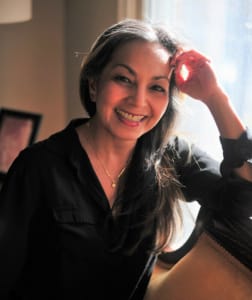
Seema Sueko
SEEMA SUEKO: Artistic Director Chris Coleman reached out to me with the opportunity in March of this year. I had worked at DCPA in 2018, directing Vietgone, and it was one of my favorite theater experiences ever. The team at DCPA is imaginative, talented, and compassionate. I knew I wanted to return to DCPA, and then I read the script for The Chinese Lady. It moved me deeply. I jumped at this opportunity.
DCPA: How would you describe the play?
SUEKO: The play spans from 1834 to 2022, and it tells an imagined story about two real-life people, Afong Moy, the first known Chinese woman to arrive in the continental United States, and her translator, Atung. The play is charming and disarming, historic and fantastic, playful and profound. It brings out of the shadows a quintessential American story, shedding light on who we all are as Americans.
DCPA: You have described the play as both factual and fictional. Can you relay what is known about Afong Moy’s story and where storytelling had to fill in or make educated assumptions?
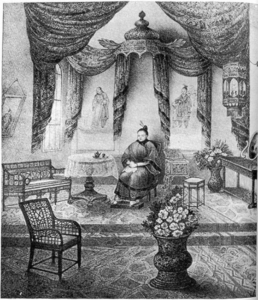
Afong Moy
SUEKO: Everything we know about Afong and Atung is what the people who gazed on them wrote in 19th century advertisements, newspaper clippings, diaries and letters. We know she was brought to New York from Guangzhou, China in 1834 by merchants Nathanial and Frederick Carnes to sit in the salons and showrooms where they sold their imported items from China. She was made to perform how to use chopsticks, how to walk on bound feet, how the Chinese brew tea, and to answer questions through a translator. We know she was toured around the eastern parts of the United States and to Cuba, and President Andrew Jackson invited her to meet him at the White House. She was promised to return to China in two years’ time, but that never happened. Her management changed over the years, and she found herself living in a poorhouse in New Jersey for eight years. In 1847 she returned to the stage under the management of P.T. Barnum and in 1850, Barnum replaced her with a younger woman. She disappears from any historic record after that.
The playwright, Lloyd Suh, has written a play in which Afong Moy and Atung speak directly to us. In real life we have no first-person accounts from them, so Lloyd said what he wrote is his ambitions for what they may have thought about their experiences, what they may have wished and hoped for, and what they saw of America and Americans, and he invites the actors and creative teams to personalize this story – to not feel they have to “imitate” someone we really know very little of – but rather to conjure and bring our own lived experiences to the storytelling.
DCPA: Denver experienced an anti-Chinese riot in 1880. How were you able to incorporate The Chinatown Riot into our production? Why did you think that was important?
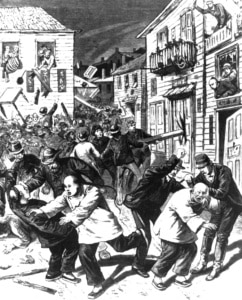
The Chinatown Riot
SUEKO: Yes. In 1880, there was an anti-Chinese race riot where over 3,000 White rioters destroyed every single structure in the city’s Chinatown. Countless were injured, and a laundry worker was hung, beaten and murdered by a White mob. No one was prosecuted and nothing was recompensed.
There is a section in the play in which the character Afong Moy fast forwards through time and lists the numerous anti-Chinese race riots and massacres that took place across the American West during the 19th and early 20th centuries leading up and surrounding the Chinese Exclusion Act. There were so many of these riots that the Denver one was not included in the original script of The Chinese Lady. I engage in a methodology called Consensus Organizing for Theater, which is about organizing with local communities around mutual self-interests. When I began working on The Chinese Lady, I expressed to Chris Coleman that I would like to connect with the Denver Asian American Pacific Islander communities. He introduced me to DCPA’s Director of Community Engagement, Jesús Quintana Martínez, and together we met and learned from so many in the local community. We learned that in 2008, a plaque was placed to commemorate where the anti-Chinese riot took place in Denver, but the plaque was disparaging in its description of the Chinatown and didn’t name a single Chinese person, not even the name of the man who was murdered. Instead, it named some White people who tried, but failed, in intervening and stopping the violence. I asked the playwright if we could incorporate information on the Denver riot in our production. He agreed and wrote a beautiful new piece of text for us. In it, the name of the man who was murdered, Look Young, is remembered and spoken out loud. In this tiny way, we’re activating this production to not only illuminate the story of Afong Moy and Atung and add them into our understanding of America, we are also highlighting the local story and activating the play to serve contemporary goals.
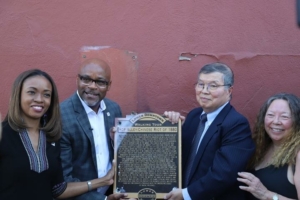
(L to R) Aisha Rousseau, City of Denver’s chief equity officer; Mayor Michael Hancock; William Wei; Linda Lung, descendant of residents of Denver’s Chinatown. Photo by Rocky Mountain PBS
The day before we began rehearsals for The Chinese Lady, the plaque was removed by the City of Denver at a moving ceremony. Now the local community is working hard to place accurate markers in the historic Chinatown area.
DCPA: Do the roles of Afong Moy and her translator need to be played by actors of Chinese descent?
SUEKO: I asked playwright Lloyd Suh about this, and he shared that he wrote this play as a community project. He wants all Asian and Asian American artists, particularly the actors from a diversity of Asian American Pacific Islander (AAPI) backgrounds, to feel ownership of it and to personalize it. We’re living in a time when Asian and Asian American artists continue to be underrepresented in the theater – the Asian American Performers Action Coalition has been doing illuminating research about this for years. We’re also living in a time of increasing violence against Asians and Asian Americans and locally through Denver Asian American and Pacific Islander Commission (DAAPIC). With Lloyd’s wishes in mind, and thanks to Grady Soapes, DCPA’s Artistic Producer and Director of Casting, we auditioned so many incredibly talented actors from a diversity of AAPI backgrounds. I can’t wait for DCPA audiences to experience Narea Kang’s and Sky Smith’s performances. They both possess tremendous range, prodigious skill with language, wonderful comic timing, and an enticing chemistry with one another.
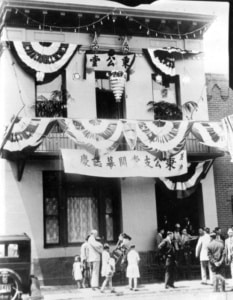
Denver’s Chinatown. Photo courtesy of Denver Public Library Western History and Genealogy Dept.
DCPA: As you have prepared for this production in Denver, you have been exceptionally pro-active in building relationships in the Asian American Pacific Islander community. What do you hope to achieve through these connections? Are there any individuals or groups whom you would like to acknowledge?
SUEKO: Denver’s local AAPI communities are doing impressive work towards nourishing the ideals of democracy and building communities where all people can succeed. Many local leaders have been extremely generous with their time to inform our production of The Chinese Lady. I was lucky to meet with Gil Asakawa, Harry Budisidharta, Soyon Bueno, Joie Ha, James Ma, Dr. William Wei, Soon Beng Yeap, Erin Yoshimura, and members of Denver Asian American Pacific Islander Commission (DAAPIC). DCPA’s Director of Community Engagement, Jesús Quintana Martínez, has cultivated a partnership with Colorado Asian Pacific United (CAPU) where their traveling exhibit will be featured in the lobby of the Denver Center as well as at the Auraria Library. Local community members Joanne Liu, Annie VanDan, Deborah Yim and Joie Ha will be facilitating talkbacks following the performances on Sept 20, 22, 29, and Oct 6. An advance film screening of I Am Denver: Chinatown will take place at DCPA in collaboration with the City and County of Denver and the Office of Storytelling on September 21. I am so excited by all of these collaborations and grateful to the local AAPI communities and DCPA.
I believe theater can be used to help solve problems, but only when we intentionally rouse the theater for public benefit. With the edits to the script, making it bespoke for Denver, the community partnerships, the talkbacks, and the lobby display, I aspire for our production to ultimately serve a greater good.
DCPA: What do you hope the audience takes away from The Chinese Lady?
SUEKO: The play invites us to see one another. I hope we all exit the theater with a little more tenderness in our hearts.
DETAILS
The Chinese Lady
Sep 9 – Oct 16, 2022 • Singleton Theatre
Tickets
